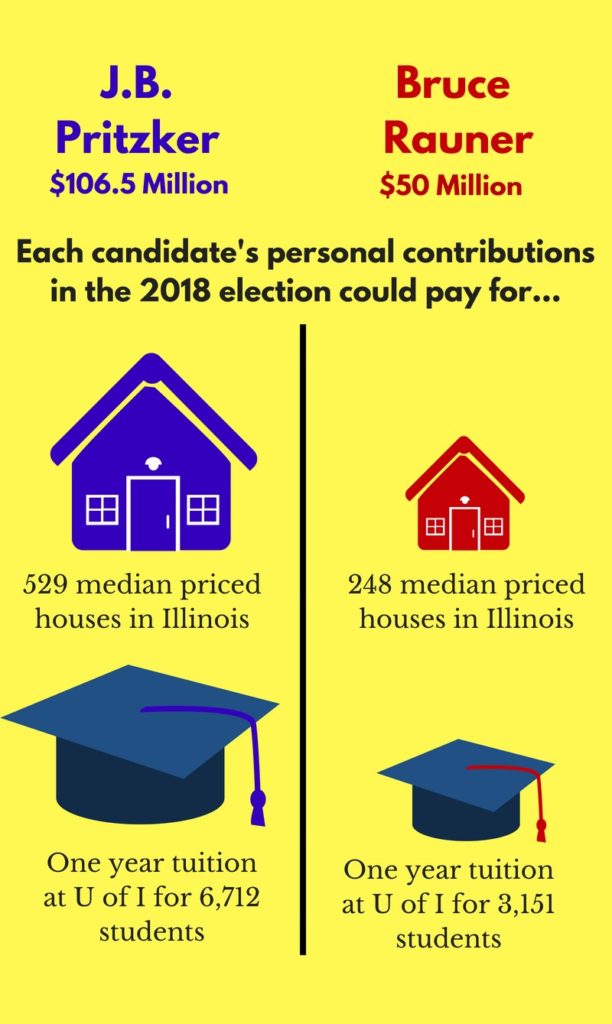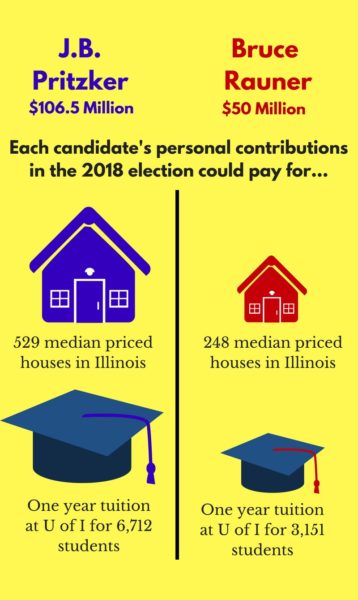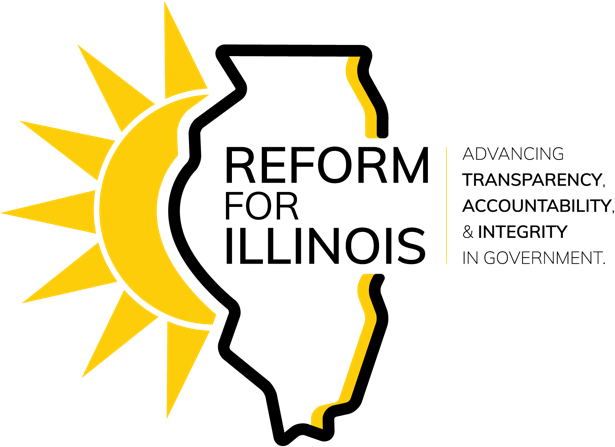Self-Funding Candidates in Illinois Gubernatorial Race: Do They Relate Financially to Average Voters?

Illinois stands alone in nominating two mega-wealthy men to run for governor. Both incumbent Republican Gov. Bruce Rauner and Democratic challenger J.B. Pritzker are known for their willingness to use their endless personal wealth to fund their campaigns. But do these men represent a typical Illinoisan?
Rauner has an estimated $500 million net worth, $50 million of which he deposited into his re-election effort in December 2016. Pritzker has an estimated $3.5 billion net worth and has pumped $106.5 million into his campaign since March 2017.
The amount Rauner and Pritzker are using to bolster their campaigns is a figure the average Illinoisan can’t relate to. As an example, the median annual household income in Illinois is $59,196, according to U.S. Census estimates.
To illustrate this contrast further, ICPR compared both Pritzker’s and Rauner’s self-funded campaign contributions to in-state tuition costs at state universities and the median sales price for houses in Illinois. Both Rauner and Pritzker have multiple homes worth tens of millions of dollars while the median sales price for a house in Illinois is $201,500, according to online real estate database company Zillow. To put this in greater perspective, Rauner’s $50 million and Pritzker’s $106.5 million of self-funded campaign dollars could buy 248 and 529, respectfully, median priced houses in Illinois.
The average in-state annual tuition at the University of Illinois at Champaign is $15,868. Pritzker’s $106.5 million campaign contribution could pay the annual tuition of 6,712 students, and Rauner’s $50 million in self-funds could pay for 3,151 students to attend Illinois’ flag-ship university.
ICPR and news media organizations have compared Illinois’ 2018 gubernatorial election to California’s 2010 gubernatorial election. California broke the record as the nation’s most expensive gubernatorial race with a $280 million price tag. However, in that race, there was only one mega-wealthy candidate, former eBay CEO Meg Whitman. Despite Whitman contributing $144 million of her own fortune to her campaign, she lost to Democratic candidate Jerry Brown, who did not self fund his campaign.
During California’s 2010 gubernatorial primary alone, candidates raised $160 million. In March, ICPR reported that Illinois’s 2018 gubernatorial primary exceeded that number by $1 million with all primary candidates for governor generating $161 million in campaign funds. Illinois is now on track to break California’s overall fundraising record in the general election any day.


Both Parties Benefit
Rauner and Pritzker both have the money to self-fund their campaigns, which is attractive to their respective parties. Both men have equipped the Republican and Democratic parties with hefty campaign funds, which position them as the de facto party leaders. Citizens for Rauner, the governor’s campaign committee, has transferred $36.3 million to the Illinois Republican Party since its February 2013 founding. J.B. for Governor, Pritzker’s campaign committee, started its “Blue Wave Illinois” program last month and has already contributed more than $2 million to Democratic committees and candidates.
Consider the implications for Illinois when there are two exceedingly wealthy men, one of whom will become governor, who can self-fund their campaigns and have enough left over to fund their party. Will this model be a prototype where wealthy candidates don’t need to rely on voters to fund their campaigns? Will this approach have an impact on our democracy in how the state is governed?
With Illinois’s current campaign finance laws, there is nothing preventing the recurrence of future candidates like Rauner and Pritzker from individually contributing millions into their own, and others’, campaigns. ICPR is monitoring how other states are creating a more equitable political landscape where candidates from all economic backgrounds can run for office and will explore how to implement these reforms, such as a small donor matching system, in Illinois.
Back
